Yellow flowers name come in a variety of shapes and sizes, and their vibrant hue adds a splash of sunshine to any garden or floral arrangement. One popular yellow flower is the sunflower, known for its tall stalks and large, bright yellow petals surrounding a dark, central disk.
Another stunning yellow flower is the daffodil, which blooms in early spring and signifies rebirth and new beginnings. With its trumpet-shaped flowers and delicate fragrance, daffodils are a favorite among gardeners and are often used in floral displays.
Lastly, the yellow rose, a classic symbol of friendship and joy, exudes elegance and beauty. Whether given as a gift or displayed in a garden, yellow roses are sure to make a lasting impression.
Yellow Flowers Name
Bidens
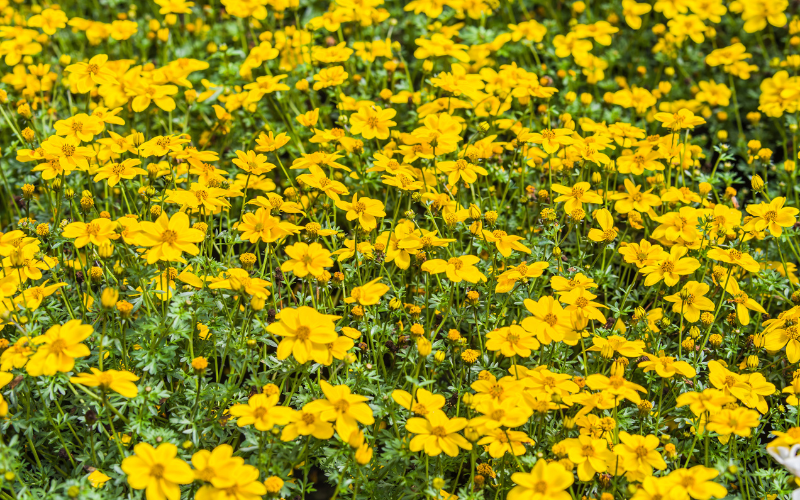
Bidens is a stunning and vibrant plant. It is commonly known as the tickseed or beggarticks flower. Bidens flowers are small, typically less than an inch (2.5 centimeters) in diameter, and have a daisy-like appearance. The petals of the ray florets can be white, yellow, or a combination of both.
Bidens flowers typically bloom in late summer or fall, but the exact timing can vary depending on the species and growing conditions. Bidens plants can have different growth habits depending on the species.
| Scientific Name | Bidens |
| Native Range | North America, South America, Africa, Europe, Asia |
| Flowering Season | Summer |
Bird of Paradise
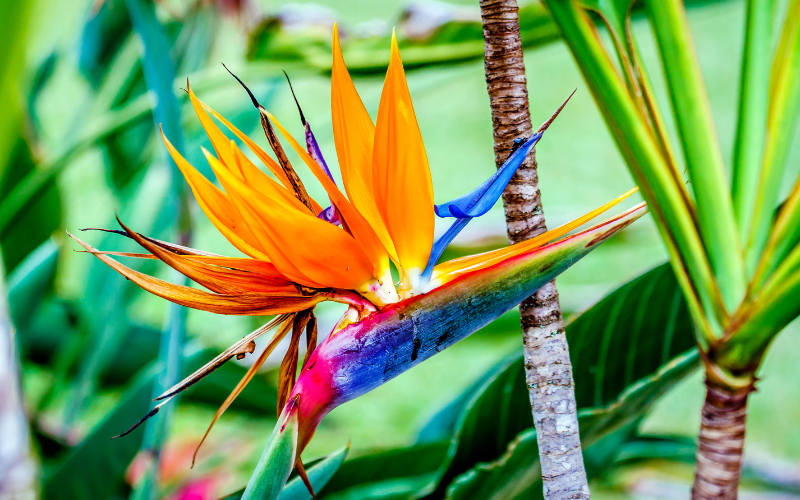
The Bird of Paradise flower, scientifically known as Strelitzia reginae, is a striking and iconic tropical plant known for its unique flowers. The Bird of Paradise plant is native to South Africa. The Bird of Paradise flower typically blooms during the warmer months of spring and summer.
It can grow to a height of 3 to 5 feet (0.9 to 1.5 meters) or even taller, depending on the growing conditions. It prefers warm climates and requires full sun to partial shade and well-drained soil. It is regarded as a symbol of joy, magnificence, and good fortune in many cultures.
| Scientific Name | Strelitzia |
| Native Range | South Africa |
| Flowering Season | Throughout the year |
Calendula
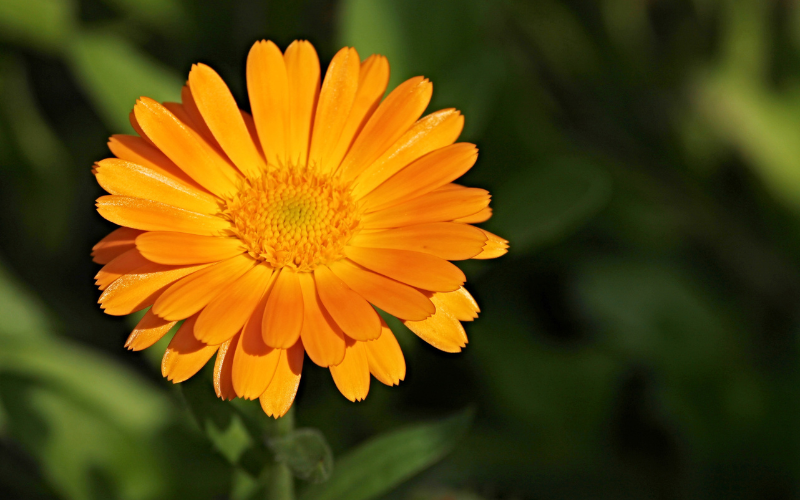
Calendula is a cheerful and versatile flowering plant from the Asteraceae family. It is scientifically known as Calendula officinalis. Calendula flowers have a vibrant and distinctive appearance. The flowers can range in size from 1 to 3 inches (2.5 to 7.5 centimeters) in diameter.
They typically start blooming in late spring or early summer and continue to produce flowers well into the fall, with intermittent blooms throughout this period. They are often grown in borders, containers, and as companion plants to deter pests. Calendula is associated with various symbolic meanings, including joy, love, and good fortune.
| Scientific Name | Calendula |
| Native Range | Southern Europe |
| Flowering Season | Spring, summer, fall |
Canna Lily
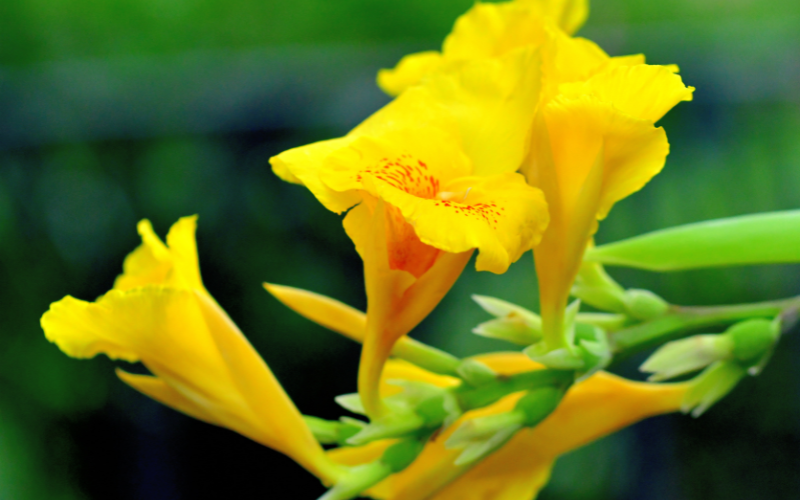
Canna Lily is a beautiful flower. It is scientifically known as Canna indica, which are tropical flowering plants that are beloved for their vibrant and showy flowers. The petals and sepals come in a wide range of colors, including shades of red, orange, yellow, pink, and white. Some cultivars also feature bi-colored or multi-colored petals.
Canna Lily flowers typically bloom from summer to fall. The plants can reach heights of 3 to 8 feet (0.9 to 2.4 meters), depending on the cultivar and growing conditions. They prefer warm climates and thrive in full sun or partial shade. They can grow in various types of soil, as long as it is well-drained.
| Scientific Name | Canna |
| Native Range | Southern United States,South to Northern Argentina |
| Flowering Season | Summer |
Daffodil
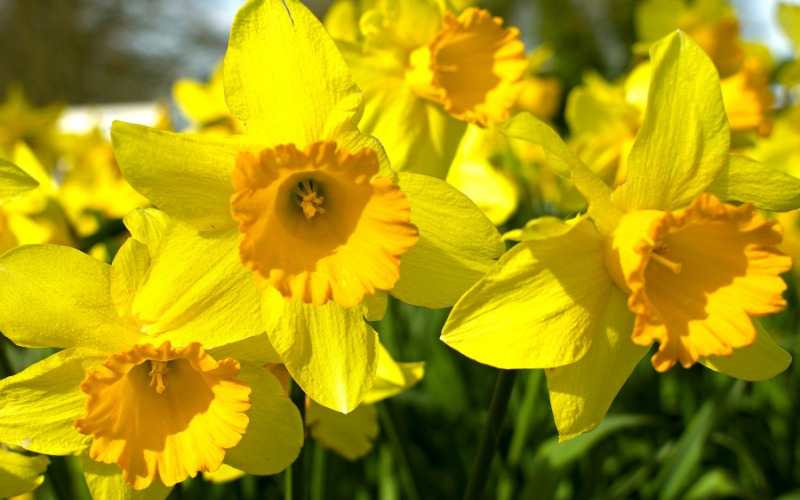
The daffodil is a stunning and vibrant flower. It is scientifically known as Narcissus, a genus of flowering plants that belong to the Amaryllidaceae family. Daffodils are renowned for their beautiful and iconic spring blooms.
They typically start to flower in late winter or early spring, depending on the specific cultivar and climate. Daffodils can range in height from 6 inches to 2 feet (15 cm to 60 cm), depending on the cultivar. Daffodils are symbols of new beginnings, rebirth, and hope. These flowers thrive in full sun or partial shade, making them versatile and easy to grow in various climates.
| Scientific Name | Narcissus |
| Native Range | Southern Europe and North Africa |
| Flowering Season | Spring and Early Summer |
Freesia
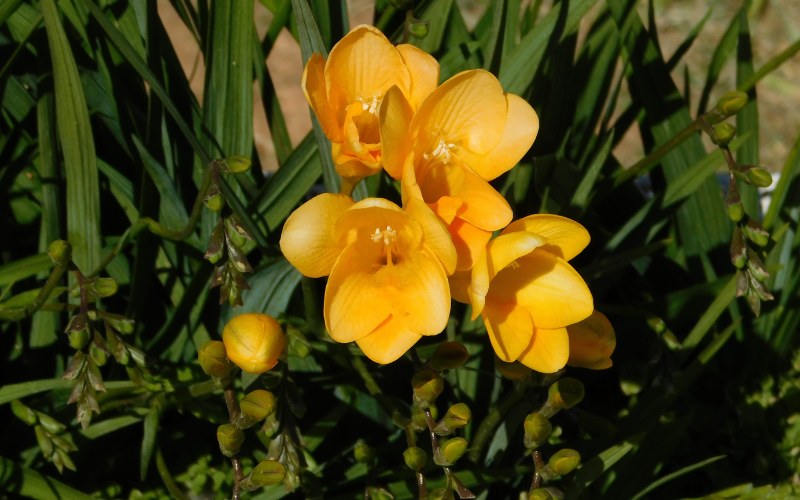
Freesia, scientifically known as Freesia spp., is a fragrant and elegant flowering plant. It is native to southern Africa. Freesia flowers come in a variety of colors, including white, yellow, pink, orange, red, and lavender. Some varieties may also exhibit bi-colored or multi-colored blooms. Freesia flowers are their delightful fragrance.
Freesia flowers typically bloom in spring and early summer. Freesias can reach a height of 12 to 20 inches (30 to 50 centimeters) and produce multiple flower stems. Freesias are sensitive to cold temperatures and are typically grown as tender perennials or as annuals in colder climates. They prefer well-drained soil and full sun or partial shade.
| Scientific Name | Freesia |
| Native Range | Southern Africa |
| Flowering Season | Late winter to early spring |
Goldenrod
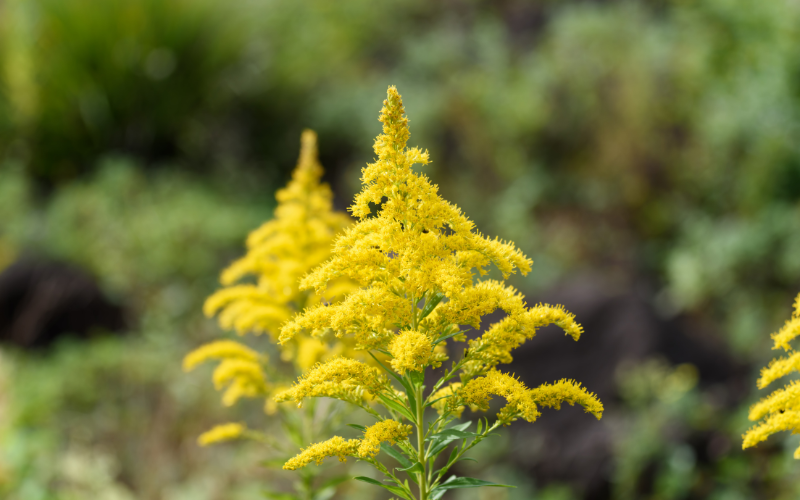
Goldenrod is a beautiful flower. These plants are known for their vibrant yellow flowers. Goldenrod is native to North America. Goldenrod flowers typically bloom in late summer and early fall, usually from August to September.
The timing can vary depending on the specific species and growing conditions. The goldenrod flower is not only visually appealing but also holds a rich history and symbolism. With its vibrant beauty, cultural significance, and medicinal benefits, the goldenrod flower truly stands as a testament to the wonders of nature.
| Scientific Name | Solidago |
| Native Range | North America, Europe and Asia |
| Flowering Season | Late-Summer to Early-Fall |
Jungle Geranium
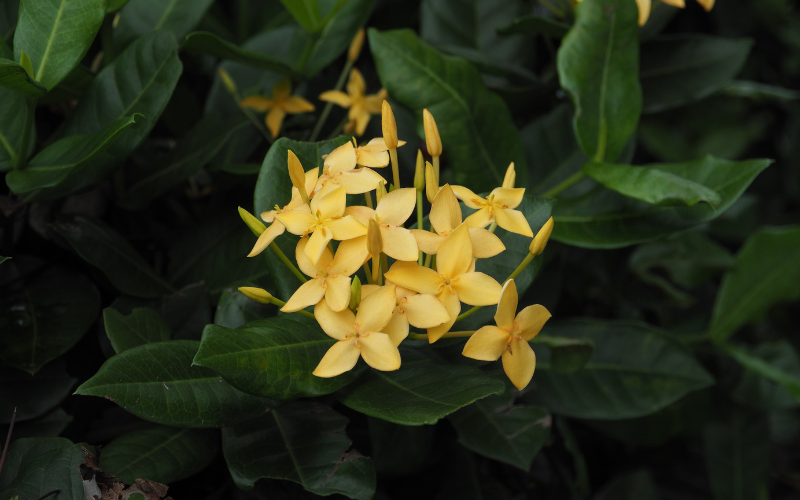
Jungle Geranium is a beautiful flower. It is native to tropical regions of Asia, including India, Sri Lanka, and Malaysia. It is a tropical flowering plant that belongs to the Rubiaceae family. It is highly valued for its vibrant and showy flowers. The flowers come in a wide range of colors, including shades of red, orange, yellow, pink, and white.
Jungle Geraniums are evergreen shrubs that can grow up to 4 to 6 feet in height. These plants thrive in warm and humid climates. They prefer full sun or partial shade and well-drained soil with a slightly acidic to neutral pH. They are also used in traditional medicine for their medicinal properties.
| Scientific Name | Ixora coccinea |
| Native Range | Southeast Asia |
| Flowering Season | Spring and Summer |
Mecardonia
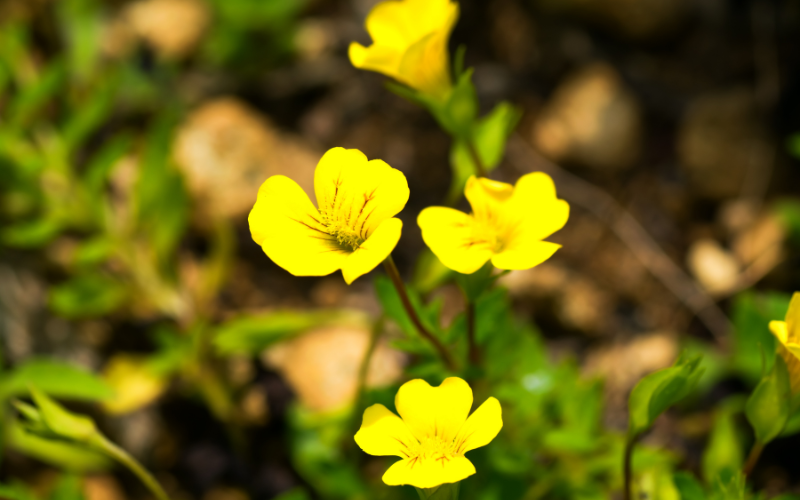
The Mecardonia flower is a stunning and unique plant. It is also known as Mecardonia ‘Gold Dust’. Native to the southeastern United States and parts of Mexico, Macedonia is valued for its small, bright yellow flowers and low-growing, creeping habit.
Mecardonia is generally low-maintenance and easy to grow. Regular watering is important to keep the soil consistently moist, but it should not be allowed to become waterlogged. Mecardonia is primarily used as a decorative plant in gardens, borders, rock gardens, and containers.
| Scientific Name | Mecardonia |
| Native Range | Americas |
| Flowering Season | Early Summer to Mid Fall |
Prickly Pear
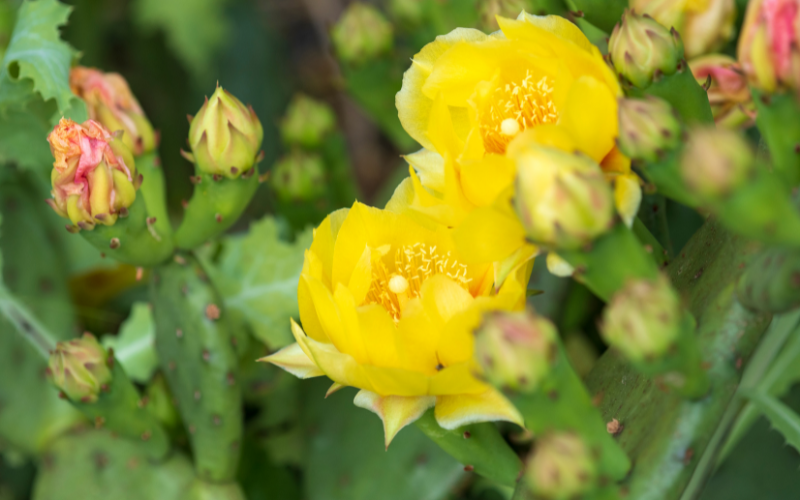
The Prickly Pear is a type of cactus that is native to the Americas. It is also known as Opuntia. Prickly Pear flowers are generally large and showy. They can measure up to 2 to 3 inches (5 to 8 cm) in diameter. The flowers have numerous petals that come in a variety of colors, including shades of yellow, orange, red, and pink.
Some varieties may even have bi-colored or multi-colored petals. Prickly Pear flowers typically bloom during the spring and early summer months. The vibrant colors and sweet nectar of the flowers attract these pollinators.
| Scientific Name | Opuntia |
| Native Range | New Mexico and Montana east to Florida and Massachusetts |
| Flowering Season | Summer |
Zinnia
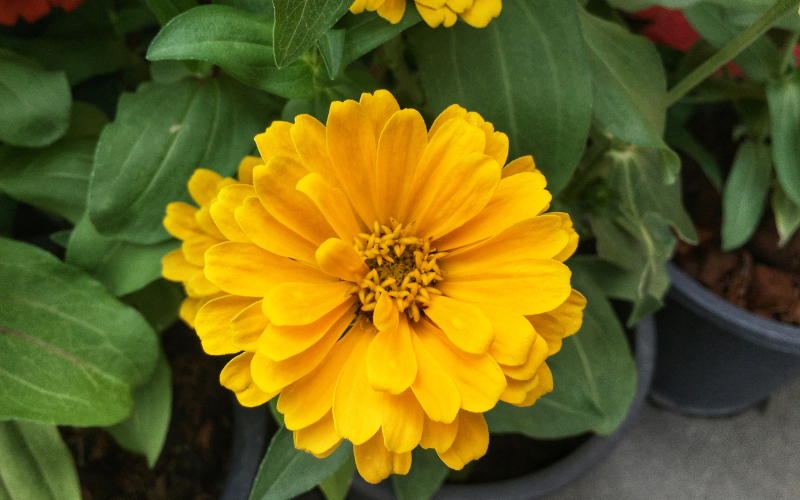
The Zinnia flower with its vibrant colors and stunning beauty. It is native to North, Central, and South America. Zinnia plants come in various sizes, ranging from a few inches to several feet tall, depending on the species and variety.
Zinnias are available in a wide array of colors, including shades of red, orange, pink, purple, yellow, and white. They prefer full sun and well-draining soil and are relatively drought-tolerant once established. Zinnias are often used in flower beds, borders, containers, and as cut flowers for floral arrangements.
| Scientific Name | Zinnia |
| Native Range | Southwestern United States, Mexico, and Central America |
| Flowering Season | Late spring until the first frost |
Yellow Yarrow
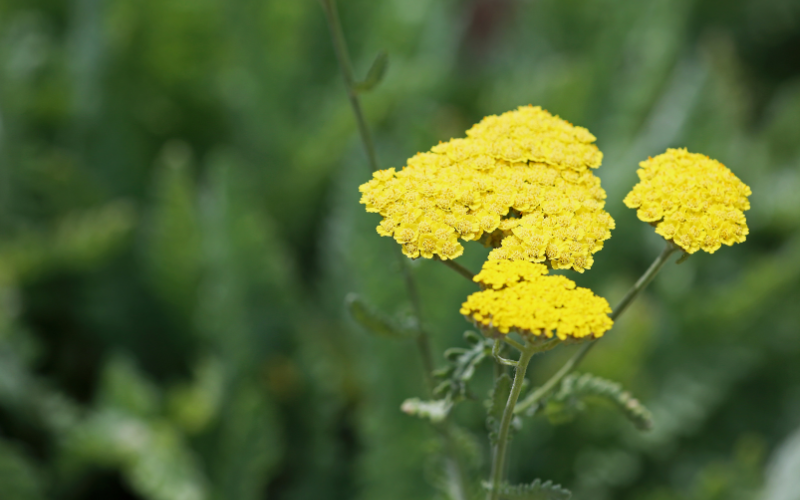
Yellow Yarrow is a beautiful flower. It is scientifically known as Achillea filipendulina. It is native to regions of Europe and Asia. Yellow Yarrow plants grow in clumps and can reach heights of about 2 to 4 feet (60 to 120 cm).
The plant prefers full sun and well-draining soil, and it is relatively drought-tolerant once established. Yellow Yarrow flowers make excellent cut flowers for floral arrangements.
| Scientific Name | Eriophyllum confertiflorum |
| Native Range | North American |
| Flowering Season | Early summer to early fall |
Yellow Oleander
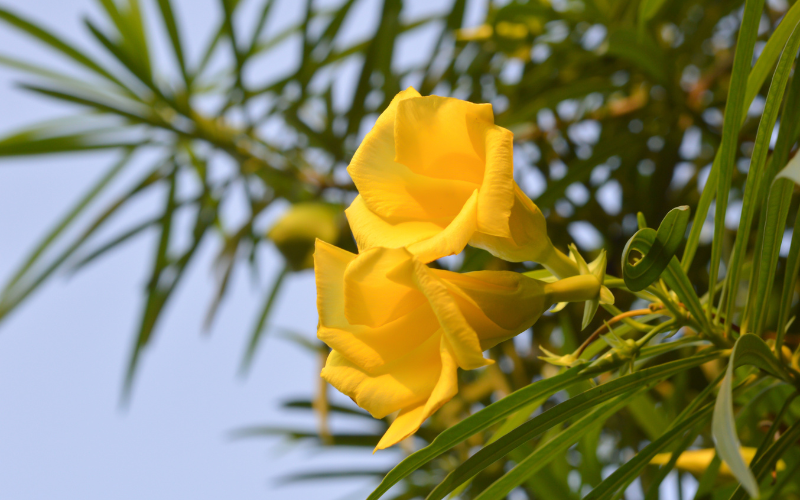
The yellow oleander is a stunning and captivating flower. It is scientifically known as Thevetia peruviana. It is native to Central and South America and is also commonly found in tropical and subtropical regions around the world.
Yellow Oleander can grow to a height of about 10 to 20 feet (3 to 6 meters) under favorable conditions. Yellow Oleander is not suitable for home gardens due to its toxicity, it is sometimes cultivated as an ornamental plant in parks, botanical gardens, and other public landscapes.
| Scientific Name | Cascabela Thevetia |
| Native Range | Mexico and Central America |
| Flowering Season | Summer to Fall |
Yellow Carnation
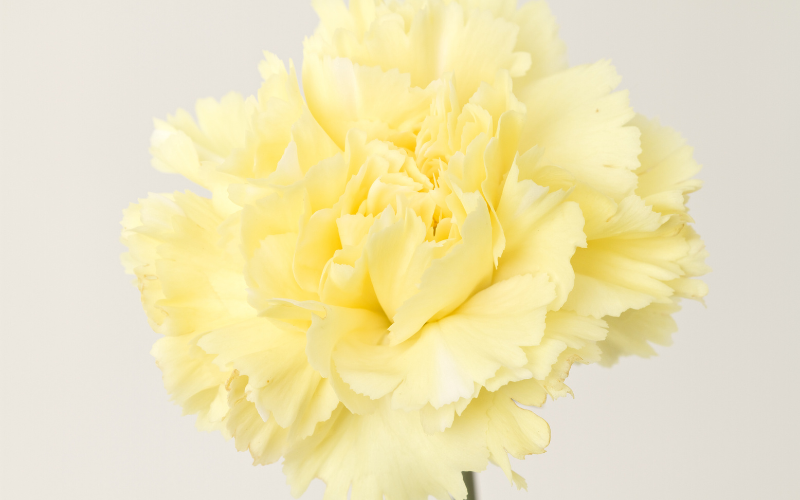
The Yellow Carnation is a beautiful flower. It is scientifically known as Dianthus caryophyllus. It comes in a wide range of colors, including red, pink, white, and purple, yellow.
They have slender, erect stems that can reach heights of about 12 to 24 inches (30 to 60 cm). The leaves are slender and grayish-green in color. The Yellow Carnations are well-loved for their long-lasting blooms and sweet fragrance.
| Scientific Name | Dianthus caryophyllus |
| Native Range | Spain, Italy, Croatia, Albania, Greece and Turkey |
| Flowering Season | Late spring up until early summer |
Yellow Butterfly Bush
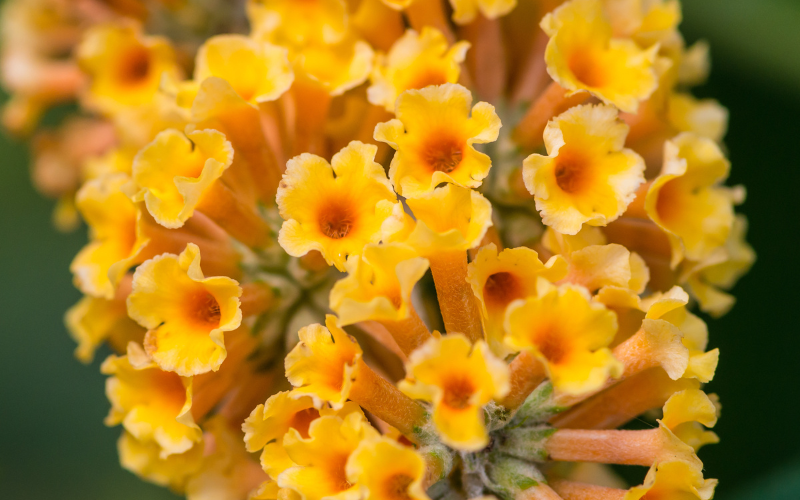
The yellow butterfly bush is a stunning and vibrant flower. It is scientifically known as Buddleja x weyeriana. The Yellow Butterfly Bush is a deciduous shrub that can grow to a height of about 6 to 10 feet (1.8 to 3 meters) and can spread to a similar width.
It prefers full sun and well-draining soil and is relatively drought-tolerant once established. Pruning the plant after flowering can help maintain its shape and encourage new growth.
| Scientific Name | Buddleja madagascariensis |
| Native Range | Sichuan and Hubei provinces in central China, and also Japan |
| Flowering Season | Summer through early fall and sometimes to the first frost |
Water Lily
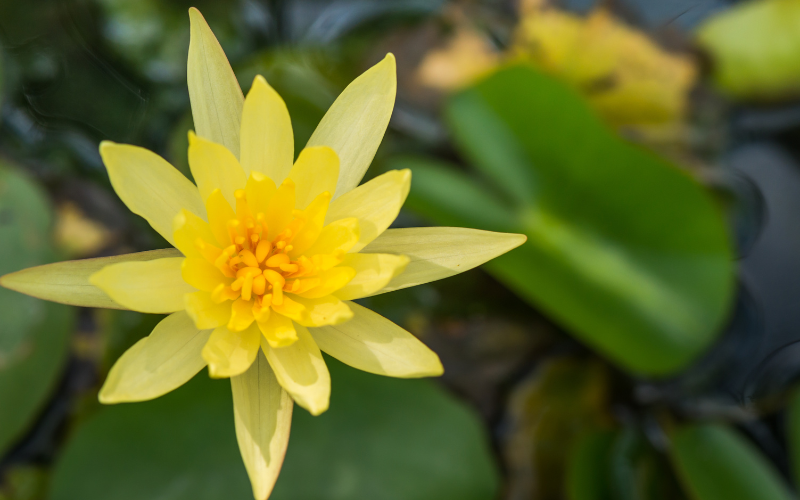
Water lilies are aquatic flowering plants belonging to the Nymphaeaceae family. Water lilies are found in freshwater habitats, such as ponds, lakes, and slow-moving rivers, across various regions worldwide.
They have round, thick rhizomes that hold the plants in the muddy or sandy bottom of the water body. They come in various colors, including white, pink, red, yellow, and blue, depending on the species and cultivar. They are often associated with purity, beauty, and rebirth.
| Scientific Name | Nymphaeaceae |
| Native Range | North American |
| Flowering Season | Summer |
Strawflower
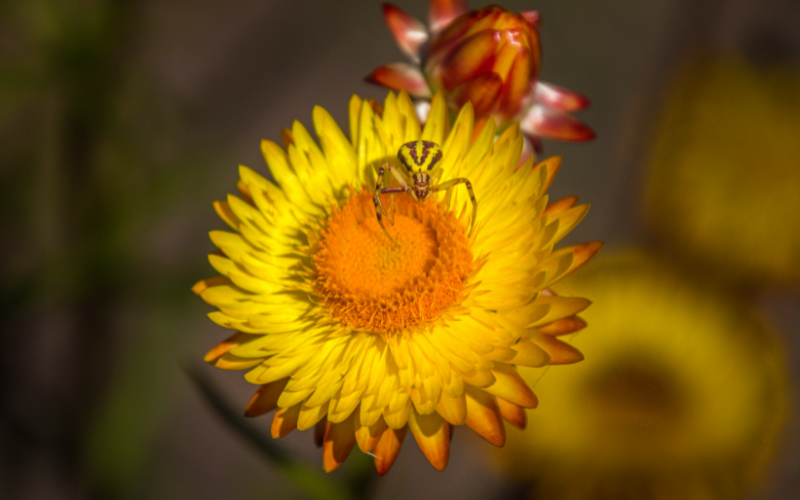
Strawflower is a lovely flowering plant. It is scientifically known as Xerochrysum bracteatum. It is native to Australia. They typically grow to a height of about 1 to 3 feet (30 to 90 cm) and have branched stems covered in grayish-green foliage.
The flower comes in various colors, including shades of white, yellow, orange, pink, and red. They prefer full sun and well-draining soil and are generally drought-tolerant.
| Scientific Name | Xerochrysum bracteatum |
| Native Range | Australia |
| Flowering Season | Summer to Frost |
Snapdragon
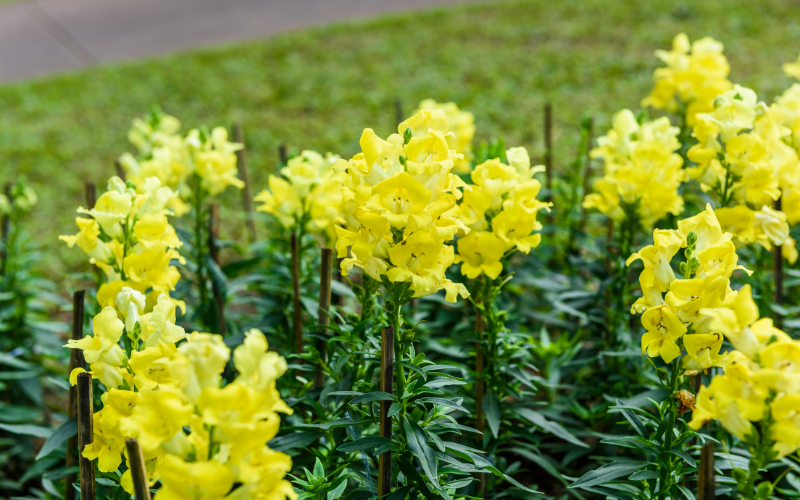
Snapdragon is a popular flowering plant in the Plantaginaceae family. It is scientifically known as Antirrhinum majus. It is native to the Mediterranean region. They typically grow to a height of about 1 to 3 feet (30 to 90 cm) and have upright, branching stems.
The snapdragon flower comes in various colors, including shades of pink, red, orange, yellow, purple, and white. Snapdragon flowers are associated with various meanings, including grace, strength, and deception, depending on cultural and historical contexts.
| Scientific Name | Antirrhinum |
| Native Range | Western North America and the western Mediterranean region |
| Flowering Season | Spring to Early Summer |
Purslane
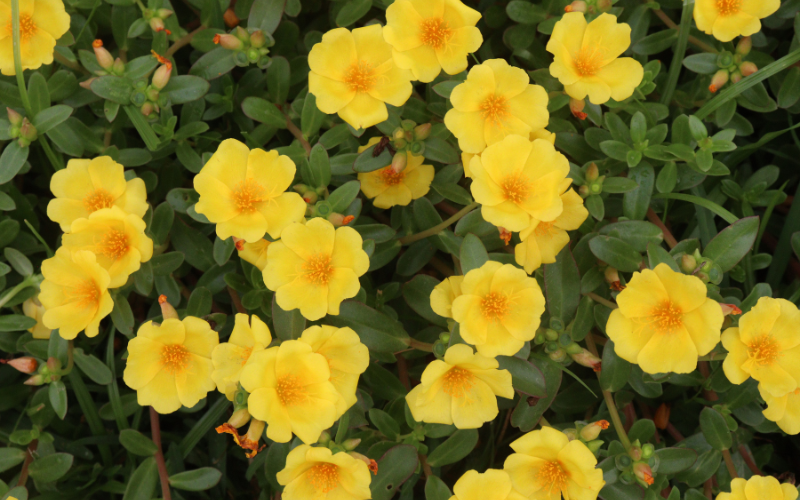
The purslane flower is a unique and fascinating plant. It is also known as Portulaca oleracea. The flowers of purslane are small, typically measuring about 1/4 to 1/2 inch (6 to 12 mm) in diameter.
They come in various colors, including shades of yellow, orange, pink, and white. They are popular for their low-growing, spreading habit and bright flowers, making them suitable for ground cover or container planting.
| Scientific Name | Portulaca oleracea |
| Native Range | North Africa, the Middle East, and the Indian subcontinent |
| Flowering Season | Midsummer through early fall |
Petunia
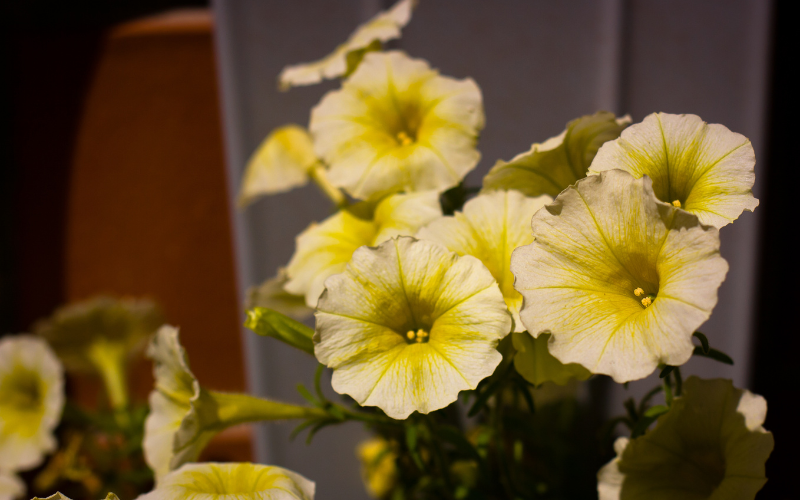
The Petunia is a beautiful flower. It is scientifically known as Petunia x hybrida. It is native to South America, specifically Argentina and Brazil. They have branching stems and can grow to a height of about 6 inches to 2 feet (15 to 60 cm).
The flowers have five petals and come in a wide range of colors, including shades of red, pink, purple, blue, white, and bi-colors. Petunias are relatively easy to grow.
| Scientific Name | Petunia |
| Native Range | South America |
| Flowering Season | Spring |
Tulip
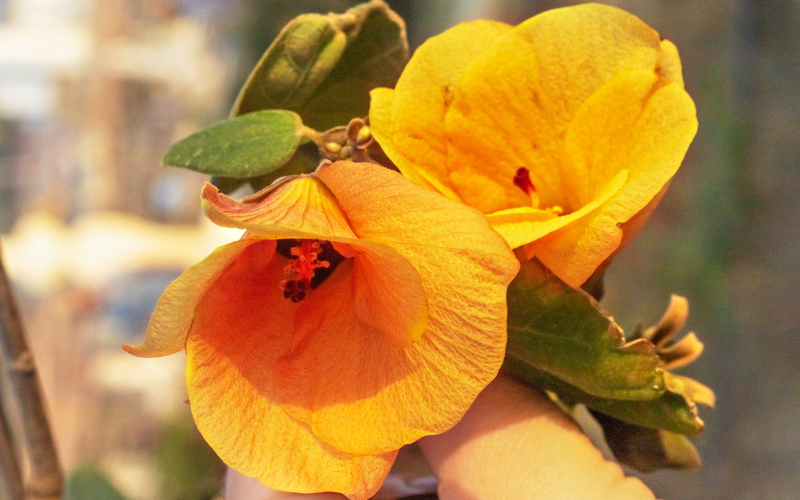
The tulip is a beautiful flower. It is native to regions in Eurasia, particularly Turkey, Iran, and Central Asia. The flowers come in a diverse range of colors, including red, pink, yellow, orange, purple, white, and even bi-colors and multi-colors.
The flowering season for tulips is typically in the spring. Tulips prefer full sun to partial shade and well-draining soil. They require regular watering, especially during their active growing season and while they are in bloom.
| Scientific Name | Tulipa |
| Native Range | Central Asia and Turkey |
| Flowering Season | Spring |
Bear’s Ear
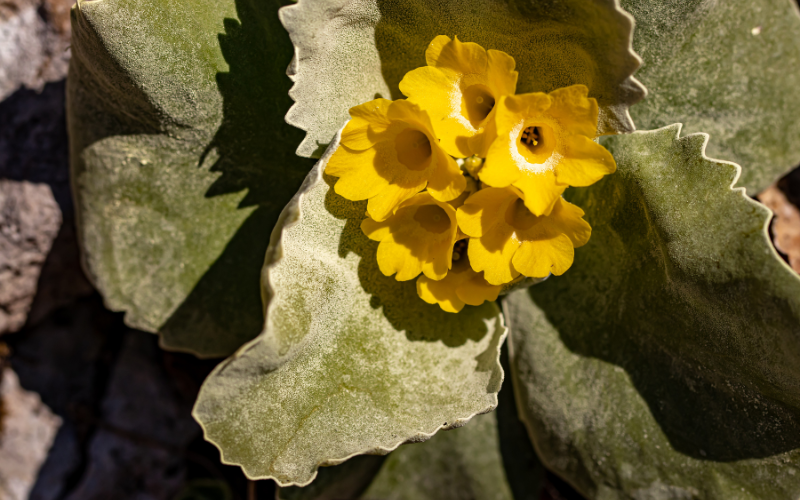
The Bear’s Ear flower is a stunning and unique plant. It is scientifically known as Primula auricula. It is native to South Africa, and Europe. It is known for its small, bell-shaped pink or white flowers and red berries that resemble a bear’s ears.
It usually blooms in spring to early summer. The Bear’s Ear flower comes in an array of vibrant colors, including shades of yellow, purple, pink, and red.
| Scientific Name | Primula auricula |
| Native Range | Europe |
| Flowering Season | Summer |
Hibiscus
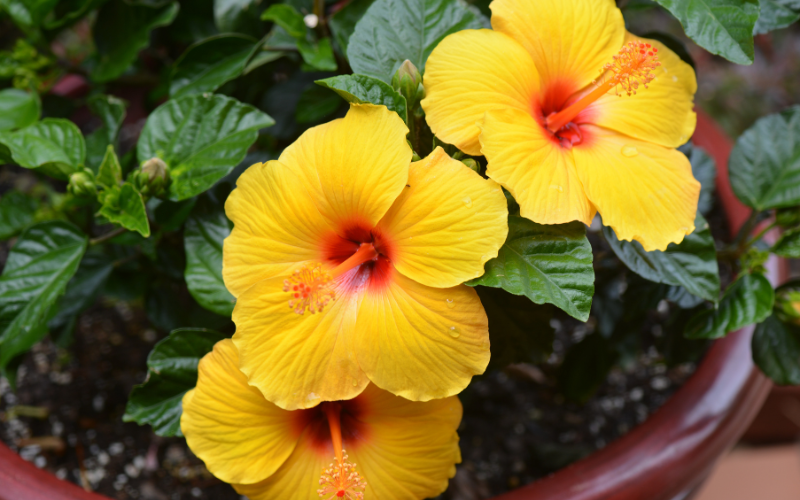
The hibiscus is a vibrant and eye-catching flower. It is native to warm regions around the world. The flowers come in a wide range of colors, including shades of red, pink, orange, yellow, white, and even multicolor varieties.
They typically bloom during the warm months, from late spring to fall. Hibiscus plants prefer full sun to partial shade and well-draining soil.
| Scientific Name | Hibiscus rosa-sinensis |
| Native Range | China and the Central United States |
| Flowering Season | Summer |
Begonia
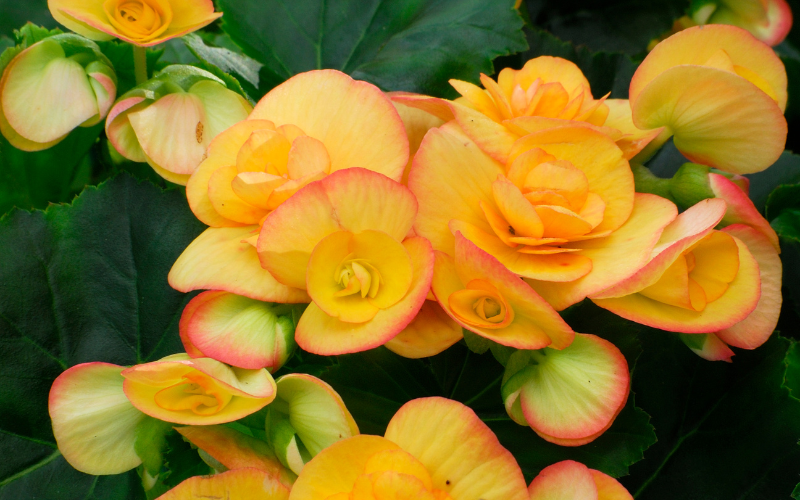
Begonia is a beautiful flower. It is known for its stunning variety of colors, shapes, and sizes. These flowers come in a wide variety of shades including pink, red, orange, white, and even multicolored patterns.
This flower thrives in moderate temperatures and is commonly found in tropical and subtropical regions, making it a popular choice for gardens and indoor plant enthusiasts.
| Scientific Name | Begonia |
| Native Range | South America, Central America, Asia, Africa |
| Flowering Season | Spring, Summer, Fall |
Ranunculus
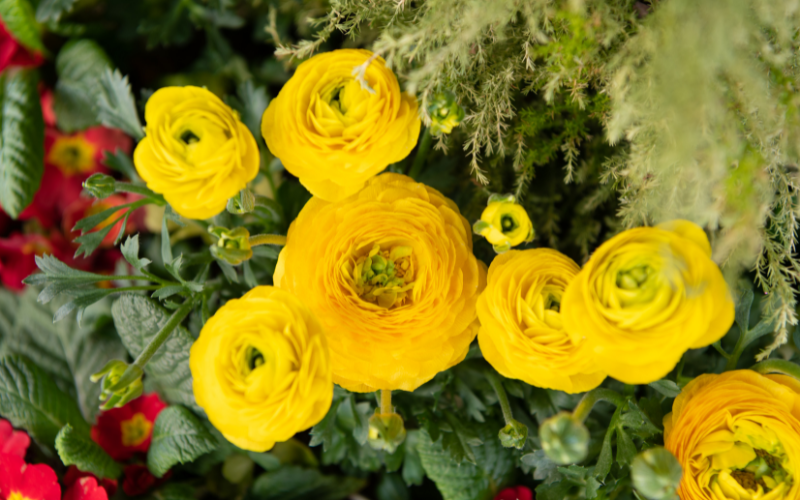
Ranunculus is a popular and charming flower. It is native to parts of Asia, including Iran and Iraq. They come in various vibrant colors, including shades of red, orange, yellow, pink, white, and purple.
They typically bloom in the spring. Ranunculus thrives in full sun or partial shade and prefers well-draining soil. They require regular watering to keep the soil consistently moist during their growing season.
| Scientific Name | Ranunculus |
| Native Range | Europe |
| Flowering Season | Early spring to summer |
Primrose
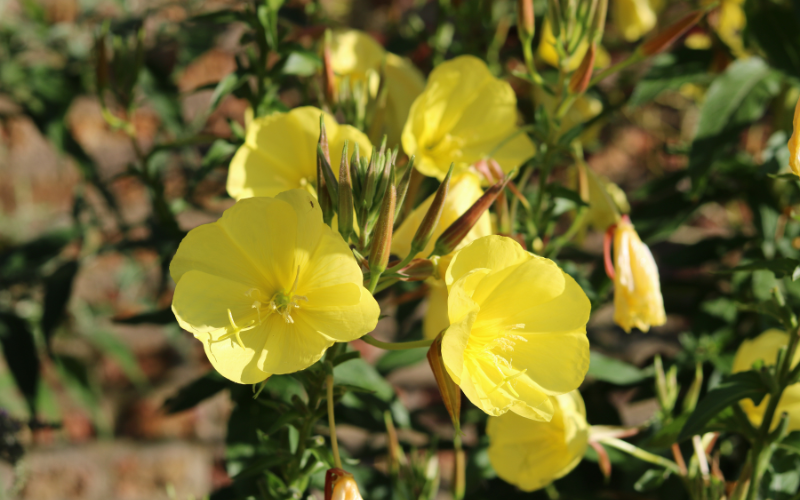
Primrose is a beautiful flower. It belongs to the Primulaceae family. It is native to various regions, including Europe, North America, and Asia. The flowers come in various colors, including shades of yellow, pink, purple, red, white, and blue.
Primroses are known for their early spring blooming. Primroses prefer partial shade to full shade and well-draining, fertile soil. They can be grown in flower beds, borders, rock gardens, and containers.
| Scientific Name | Primula vulgaris |
| Native Range | Western and southern Europe, northwest Africa, and parts of Southwest Asia |
| Flowering Season | Late winter to early spring |
Pansy
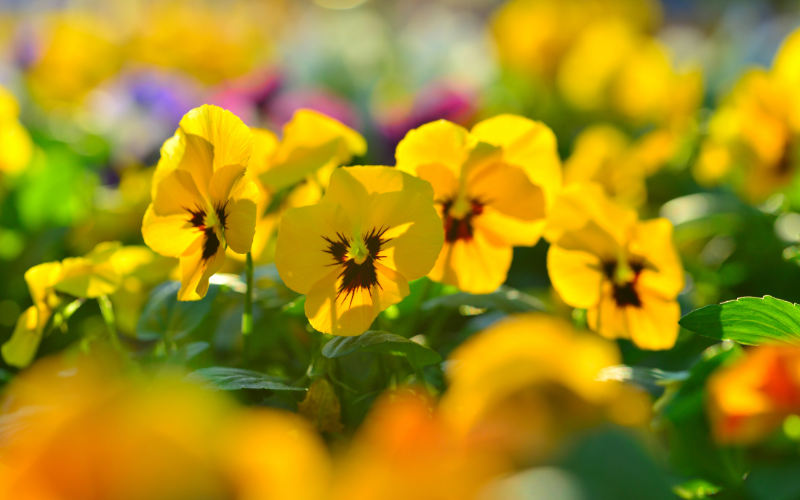
Pansy is a vibrant flower. The petals come in various colors, including shades of purple, yellow, orange, red, blue, white, and multi-color combinations.
Pansies are cool-season flowers and are best known for their ability to bloom in early spring and fall when temperatures are cooler. Pansies prefer full sun to partial shade and well-draining soil. They perform best in cool, moist conditions.
| Scientific Name | Viola tricolor var. hortensis |
| Native Range | Europe, Western Asia, and North Africa |
| Flowering Season | Spring to Summer |
Night-Blooming Jasmine
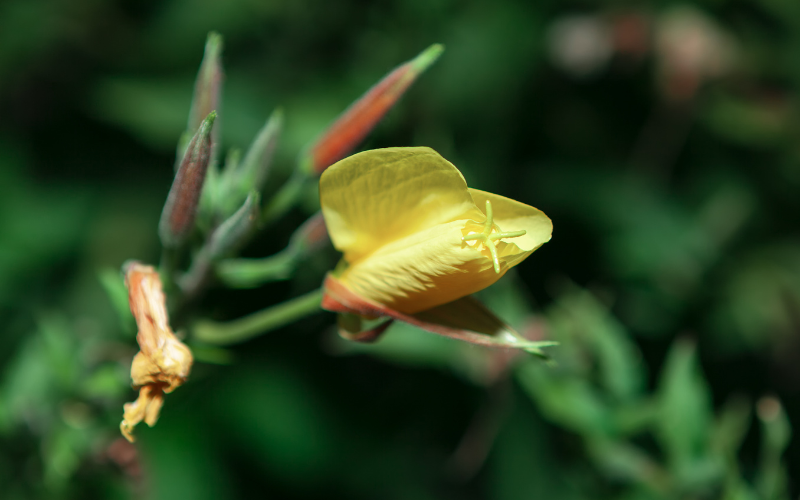
Night-Blooming Jasmine is a beautiful flower. It is scientifically known as Cestrum nocturnum. Night-blooming jasmine is native to the West Indies and some parts of South America.
The flowers typically open in the late evening and emit their powerful fragrance throughout the night and into the early morning. During the daytime, the flowers often close up, making them less noticeable during daylight hours.
| Scientific Name | Cestrum nocturnum |
| Native Range | Asia |
| Flowering Season | Summer through fall |
Moss Rose
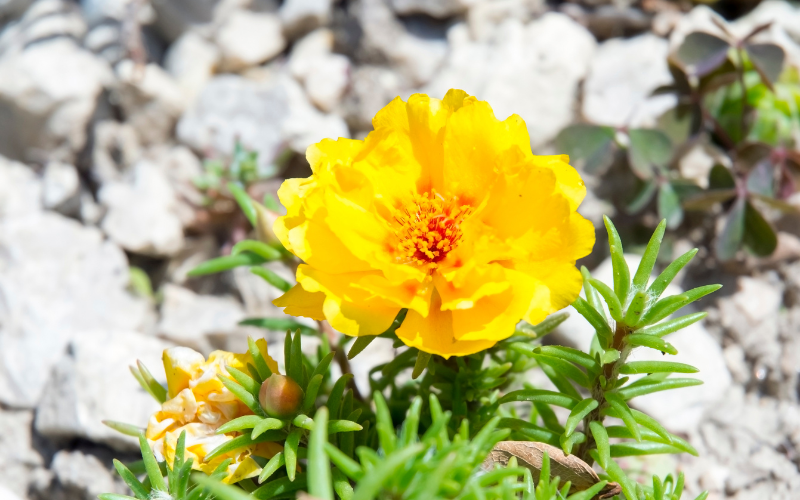
Moss Rose is a low-growing and colorful flowering plant belonging to the Portulacaceae family. It is also known as Purslane or Sun Rose. It is native to South America.
It comes in a wide array of colors, including shades of red, pink, orange, yellow, white, and bi-colors. Moss Rose is known for its prolific and continuous blooming throughout the summer months. Moss Rose thrives in full sun and well-draining soil.
| Scientific Name | Portulaca grandiflora |
| Native Range | Argentina, southern Brazil, and Uruguay |
| Flowering Season | Summer to the first frost of the fall |
Lesser Celandine
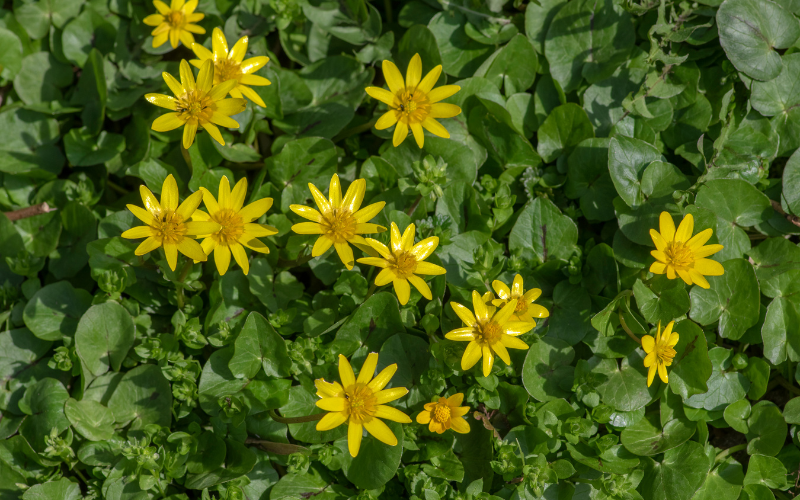
Lesser Celandine is a small, early-flowering plant. It is native to Europe and Western Asia and has been introduced to other parts of the world, including North America.
Lesser Celandine flowers have bright yellow, shiny, and glossy petals that are typically about 1 inch (2.5 cm) in diameter. It typically blooms from late winter to early spring, depending on the region and local climate.
| Scientific Name | Ficaria verna |
| Native Range | Europe, Asia, and northern Africa |
| Flowering Season | Spring |
Wishbone
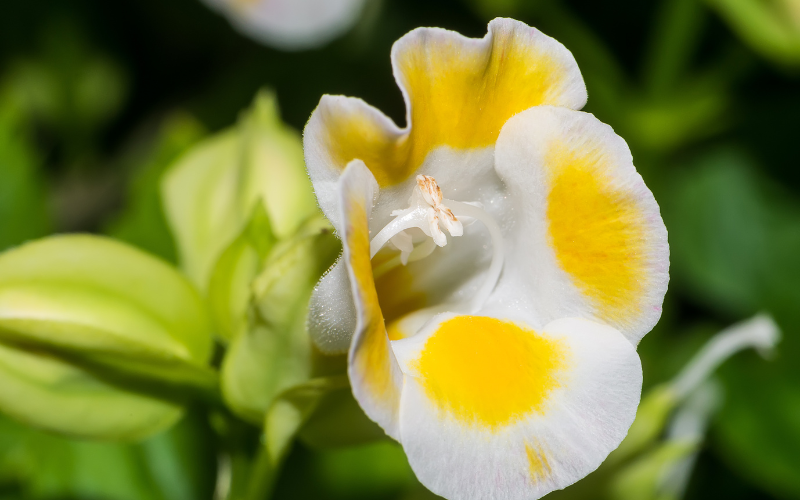
The wishbone flower is a charming and delicate plant. It is scientifically known as Torenia fournieri. It is native to Asia and Africa. The wishbone flower grows up to about 6 to 12 inches in height.
It comes in shades of coral purple, lavender, blue, pink, and white. The wishbone flower thrives in environments with partial to full shade, making it an excellent choice for brightening up areas of the garden that receive less direct sunlight.
| Scientific Name | Torenia fournieri |
| Native Range | Asia and Africa |
| Flowering Season | Summer to Fall |
Marigold
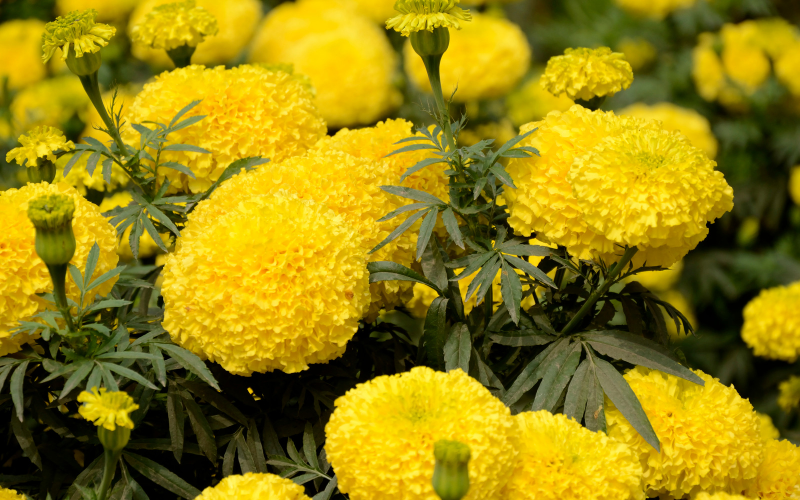
Marigold is a vibrant and popular flower. It is scientifically known as Tagetes. It is native to the Americas. These flowers come in various shades of yellow, orange, and red.
Marigolds carry cultural and symbolic significance across various traditions. Marigold plants typically grow to heights ranging from 6 inches to 3 feet, depending on the variety.
| Scientific Name | Tagetes |
| Native Range | America |
| Flowering Season | Early summer until hard frost in late fall |
Leontodon
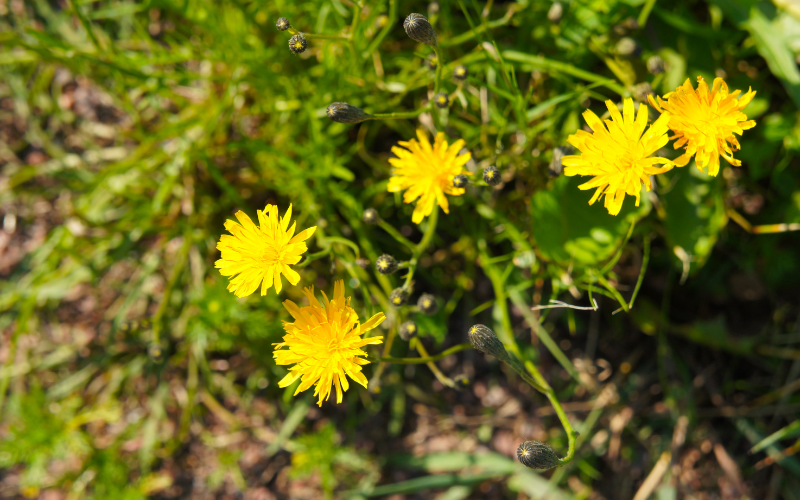
The Leontodon is a charming and intriguing wildflower. It is commonly known as Hawkweed or Dandelion. Hawkbit flowers are small and charming, similar to daisies in appearance.
These flowers come in varying shades of yellow, from pale to vibrant. A unique feature of this flower is its ability to adapt and thrive in various environments, from meadows and fields to mountainsides and even cracks in the ground.
| Scientific Name | Leontodon |
| Native Range | Macaronesia, Europe to Medit. and Iran |
| Flowering Season | Summer |
Iris
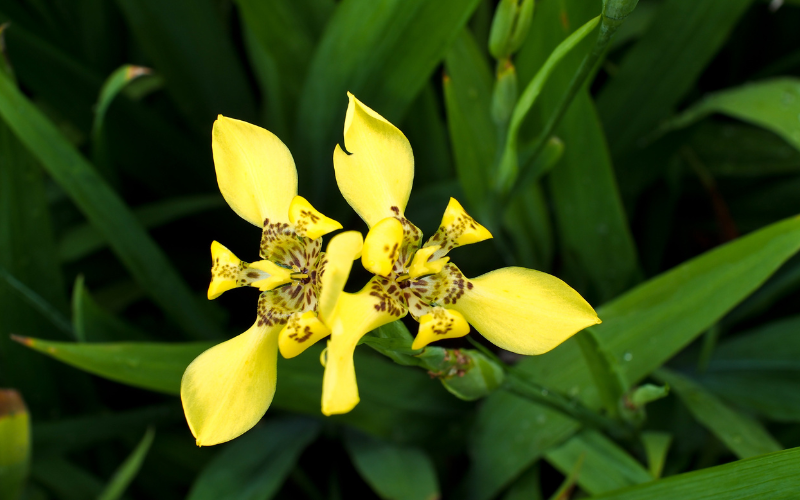
The iris flower is a stunningly beautiful plant. These striking flowers come in a variety of colors, including shades of purple, blue, yellow, white, and more. These versatile plants thrive in different environments, from moist to well-drained soils.
Irises are known for their symbolism in various cultures. The flower gets its name from the Greek word “iris,” meaning rainbow, which perfectly describes the stunning array of colors it displays.
| Scientific Name | Iris |
| Native Range | Europe and Asia |
| Flowering Season | Late spring to early summer |
Lantana
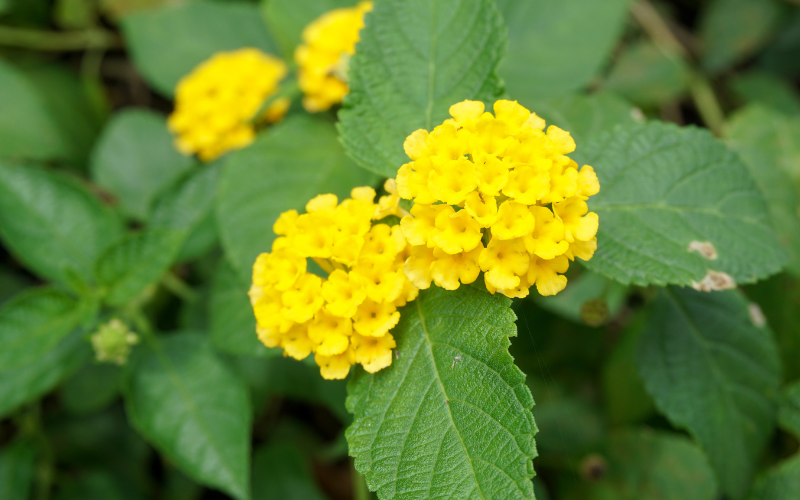
Lantana is a charming and vibrant flower. It is native to Central and South America. It comes in a wide variety of shades, including pink, yellow, orange, purple, and white.
The Lantana is a hardy plant that thrives in warm climates and requires minimal care, making it a favorite choice for gardeners. The Lantana flower never fails to add a touch of natural beauty and charm to any outdoor space.
| Scientific Name | Lantana |
| Native Range | West Indies and Mexico to Tropical America |
| Flowering Season | Late spring through frost |
Hellebores
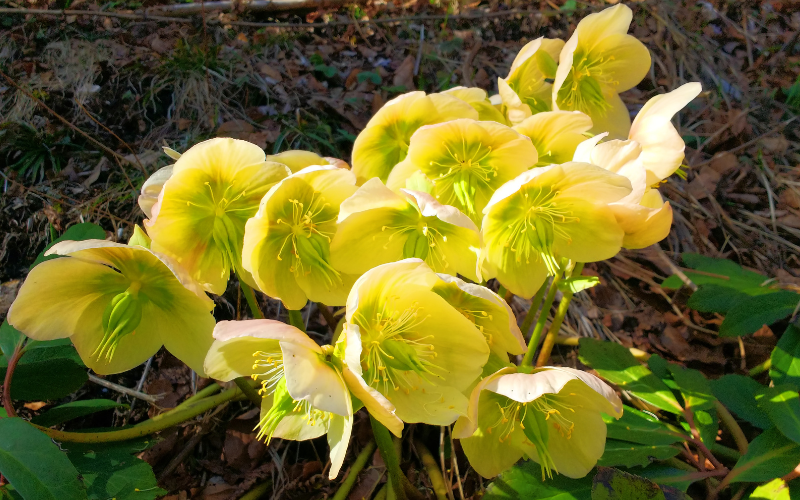
Hellebores is a stunning flower. It is also known as Lenten Roses or Christmas Roses. It is native to Europe and Asia. They come in a range of colors, including shades of white, pink, purple, and green.
Hellebores start flowering in late winter to early spring. These plants are considered low-maintenance, requiring well-draining soil and occasional watering.
| Scientific Name | Helleborus ×hybridus |
| Native Range | Europe and Asia |
| Flowering Season | Winter until spring |
Graham Thomas Rose
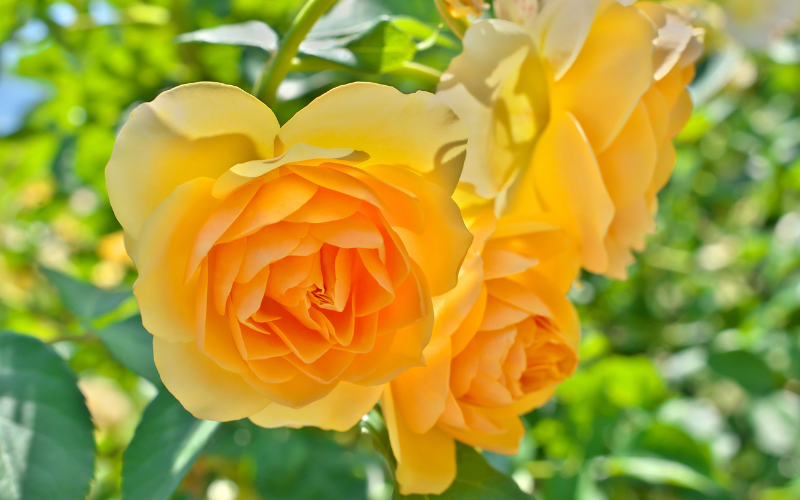
The Graham Thomas rose is a true masterpiece in the world of flowers. It can reach heights of 4 to 5 feet, making it an ideal choice. The Graham Thomas Rose features large, cup-shaped blooms with a rich, warm yellow hue that deepens as the flowers mature.
The flowers are produced in clusters and appear from late spring through fall. The Graham Thomas rose is a vigorous climber, reaching impressive heights and adorning trellises and arbors with its falling blooms.
| Scientific Name | Rosa ‘Graham Thomas’ |
| Native Range | United Kingdom |
| Flowering Season | Spring |
Gerbera Daisy
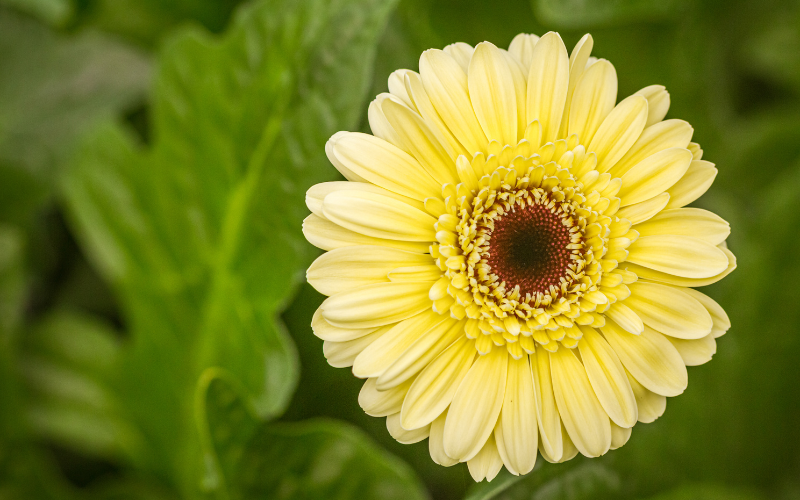
Gerbera Daisy is a beautiful flower. It is native to South Africa. The colors are wide-ranging and include shades of pink, red, orange, yellow, and white.
These plants thrive in well-draining soil and prefer full sunlight, although they appreciate some shade during the hottest parts of the day. They are often associated with happiness, joy, and innocence, making them a popular choice.
| Scientific Name | Gerbera jamesonii |
| Native Range | Latin America and Southeast Asia |
| Flowering Season | Late spring through autumn |
Dutch Hyacinth
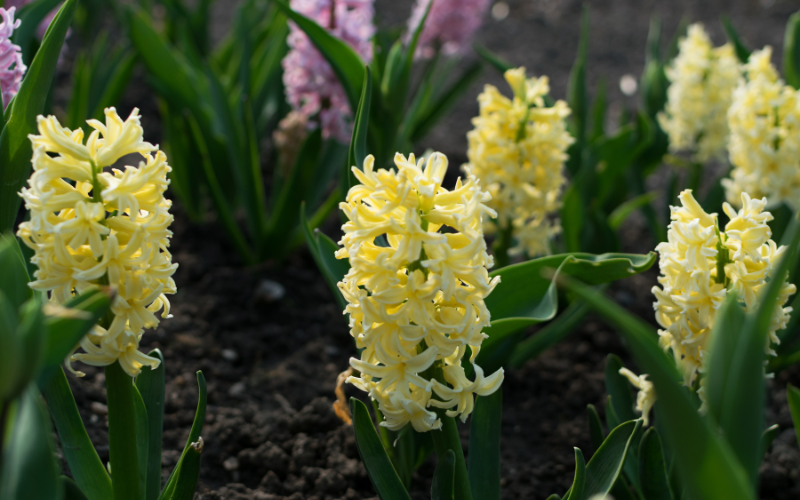
The Dutch Hyacinth is a stunning flower. It is also known as Hyacinthus Orientalis. It is native to the Mediterranean and southwestern Asia. These clusters rise from a single central stem and come in a range of colors, including shades of blue, purple, pink, white, and even yellow.
These spring-blooming bulbs are planted in the fall for flowering in the following spring. They prefer well-draining soil and a sunny to partially shaded location.
| Scientific Name | Hyacinthus orientalis |
| Native Range | Southwestern Asia |
| Flowering Season | Spring |
Daylily
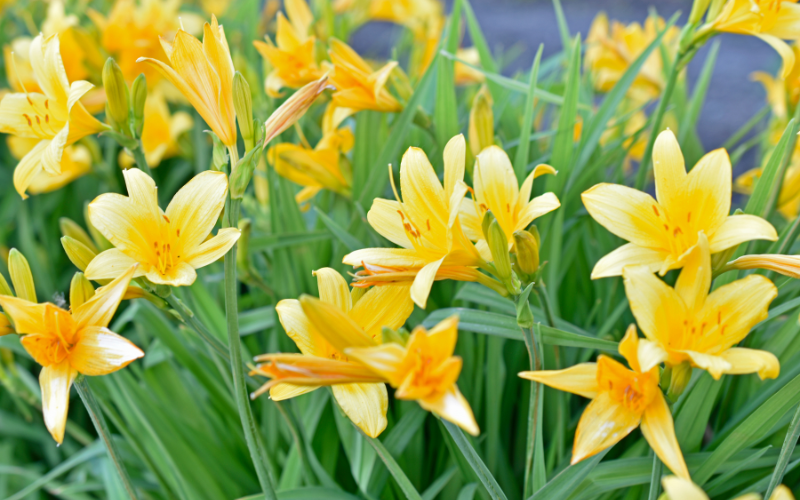
The daylily is a beautiful and fascinating flower. It is scientifically known as Hemerocallis. It is native to Asia. The flowers come in a wide range of colors, including shades of red, orange, yellow, pink, and even near-white.
They thrive in a variety of soil types and lighting conditions, making them versatile and adaptable choices for garden beds, borders, and containers.
| Scientific Name | Hemerocallis lilioasphodelus |
| Native Range | Asia |
| Flowering Season | Spring |
Black-Eyed Susan
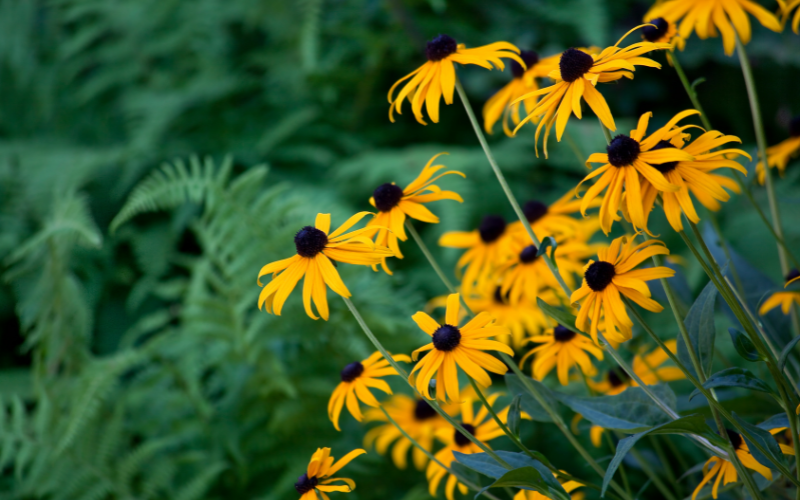
Black-Eyed Susan is a beautiful flower. It is also known by its scientific name Rudbeckia hirta. It is native to North America. The flowers grow to a height of 1 to 3 feet (30 to 90 cm).
Black-Eyed Susan typically blooms from early to late summer. It has vibrant golden-yellow to orange-yellow ray petals. They thrive in full sun to partial shade and prefer well-drained soil.
| Scientific Name | Rudbeckia hirta |
| Native Range | America, Asia |
| Flowering Season | Early summer to late fall |
Calibrachoa
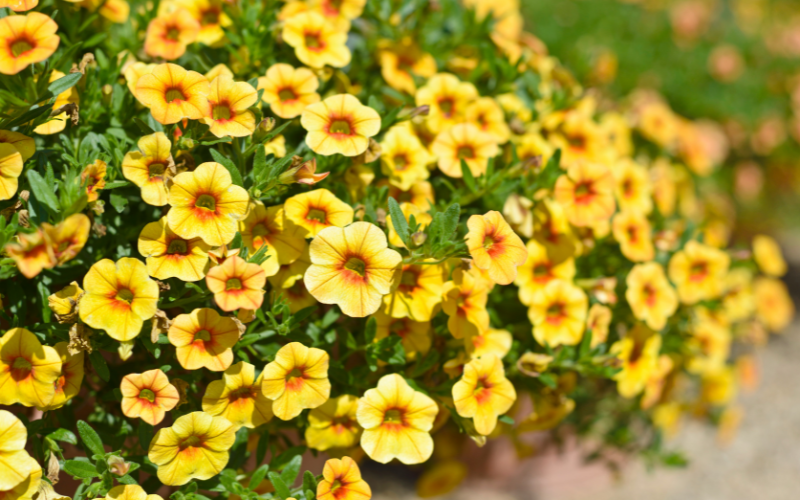
The Calibrachoa is a stunning and versatile flower. also known as Million Bells or Mini Petunia. It is native to South America. The flowers come in a wide range of colors, including purple, pink, red, yellow, orange, and white.
It typically blooms from late spring until the first frost in the fall. The flowers are often used in hanging baskets, and containers, and as ground cover in gardens and landscapes.
| Scientific Name | Calibrachoa parviflora |
| Native Range | Brazil, America |
| Flowering Season | Summer |
Carolina Yellow Jasmine
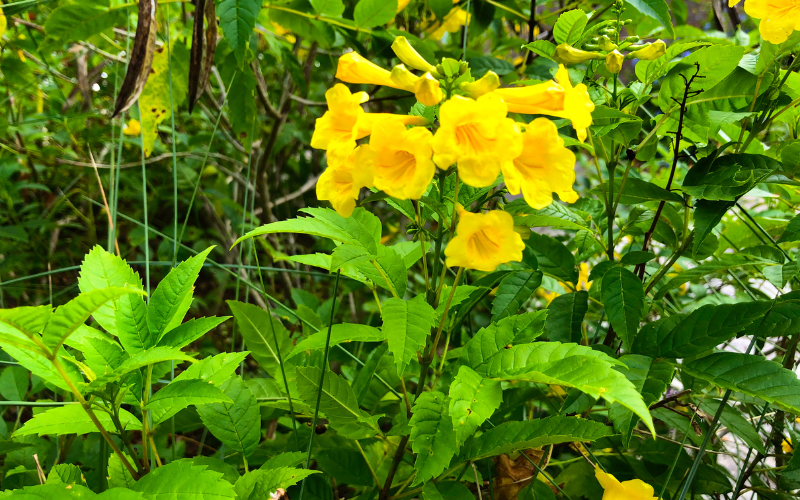
Carolina Yellow Jasmine is a beautiful flower. It is scientifically known as Gelsemium sempervirens. It is native to the southeastern United States. The vibrant yellow petals, with their soft and velvety texture.
Carolina Yellow Jasmine prefers well-draining soil and a sunny to partially shaded location. It can be trained to grow as a vine on trellises or fences or as a shrub with regular pruning.
| Scientific Name | Gelsemium sempervirens |
| Native Range | Southeastern United States |
| Flowering Season | Spring |
Blanket Flower
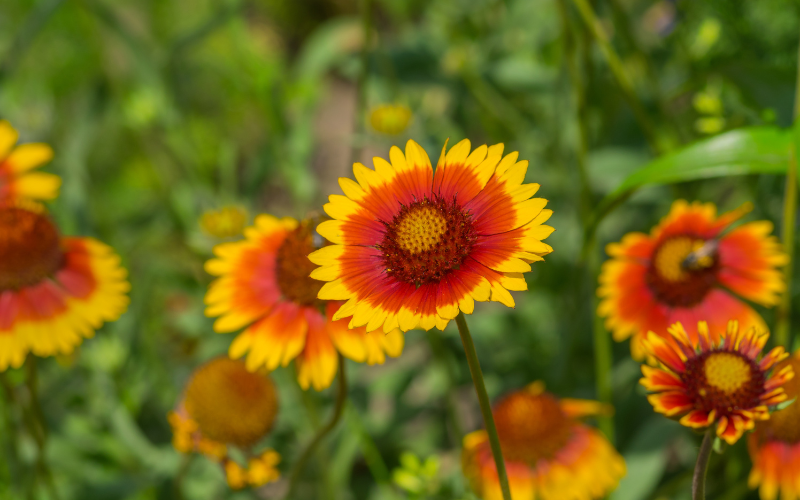
Blanket Flower is a lovely flower. It is scientifically known as Gaillardia. It is native American blankets. The flowers come in various shades, including red, orange, and yellow.
The flowers bloom in late spring or early summer through to the first frost in fall. Blanket Flowers are relatively easy to grow and are well-suited to sunny gardens with well-draining soil. They thrive in full sunlight and are drought-tolerant once established.
| Scientific Name | Gaillardia |
| Native Range | America |
| Flowering Season | Early summer to fall |
Dahlia
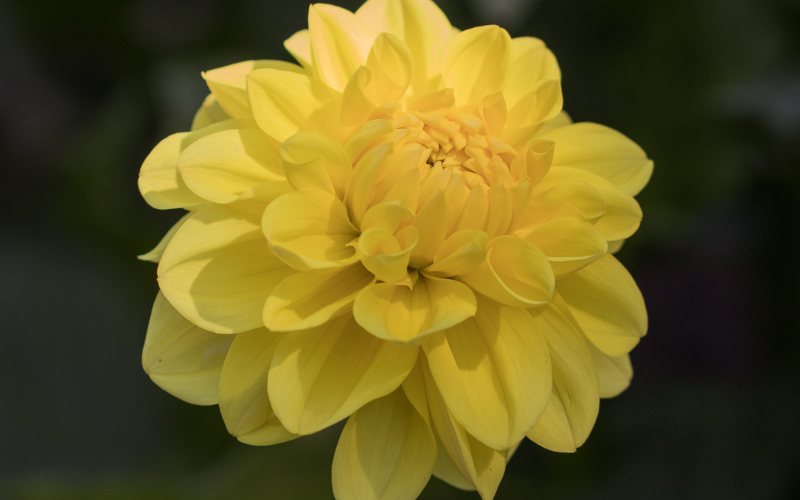
Dahlia is a beautiful flower. It is native to Mexico and Central America. Dahlia flowers can be as small as 2 inches (5 cm) or as large as a dinner plate. They come in a wide array of colors, including shades of red, orange, yellow, pink, purple, and even bi-color varieties.
Dahlias are late-summer and fall bloomers, with their peak flowering season occurring from mid-summer to the first frost.
| Scientific Name | Dahlia pinnata |
| Native Range | Mexico and Central America |
| Flowering Season | Mid-Summer to the first frost in the fall |
Craspedia
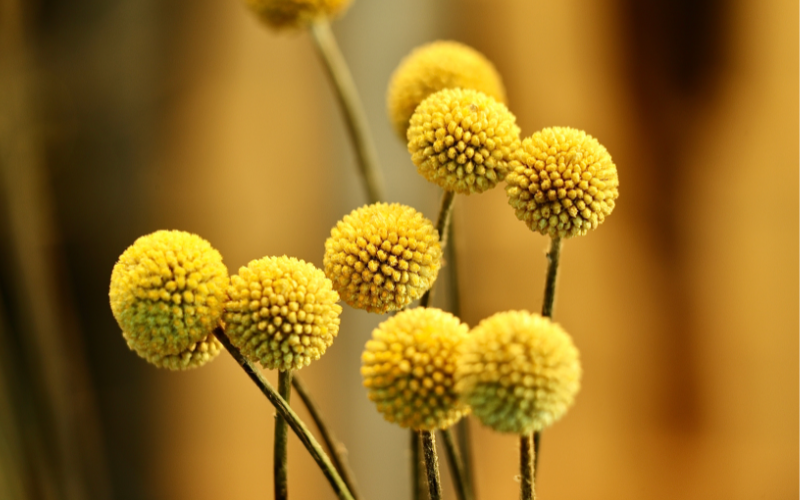
The Craspedia is a unique and charming flower. It is commonly known as “Billy Buttons” or “Drumstick Flower.” It is native to Australia and New Zealand. The florets are typically bright yellow.
The flowers measure just over an inch (2.5 cm) in diameter, while others can reach up to 2 inches (5 cm) or more. The Craspedia typically blooms during the late spring and summer months.
| Scientific Name | Craspedia globosa |
| Native Range | Australia and New Zealand |
| Flowering Season | Late spring and summer |
Bulbine
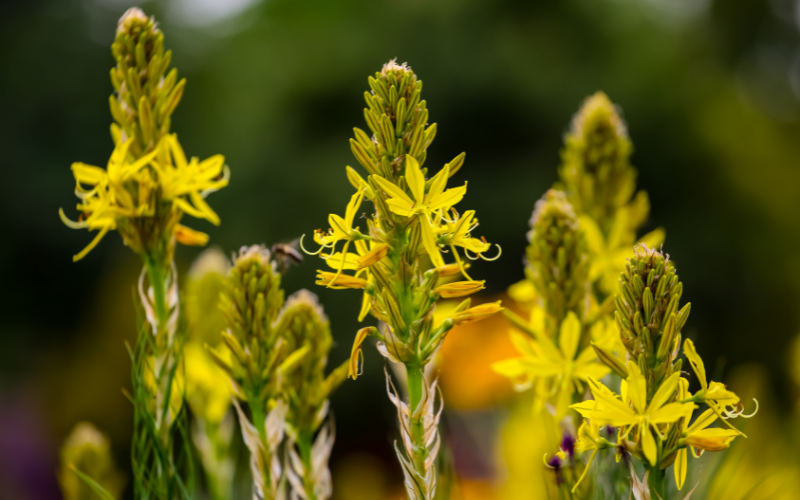
The Bulbine Flower is a vibrant and fascinating flower. It is commonly known as Bulbine, Burn Jelly Plant, or Stalked Bulbine. It is native to various regions of Africa, including South Africa.
The flowers can come in various colors, including yellow, orange, or pink. The flowers are typically small to medium-sized and have a delicate appearance. It is relatively easy to grow and is well-suited for dry or arid climates.
| Scientific Name | Bulbine frutescens |
| Native Range | Southern Africa |
| Flowering Season | Spring to Summer |
Chrysanthemum
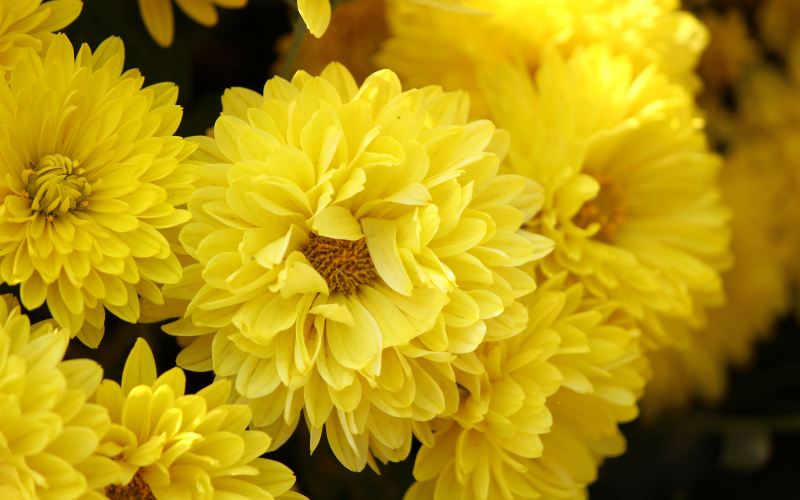
Chrysanthemum is a beautiful flower. This flower has become a symbol of joy, longevity, and positive energy in many cultures around the world. The flowers come in colors that vary widely, including shades of white, yellow, orange, red, pink, and purple.
Chrysanthemums are known for their late-season blooms, making them a popular choice for fall gardens. It requires well-draining soil, ample sunlight, and regular watering.
| Scientific Name | Chrysanthemum × morifolium |
| Native Range | East Asia and Northeastern Europe |
| Flowering Season | Late summer to early autumn |
Bulbous Buttercup
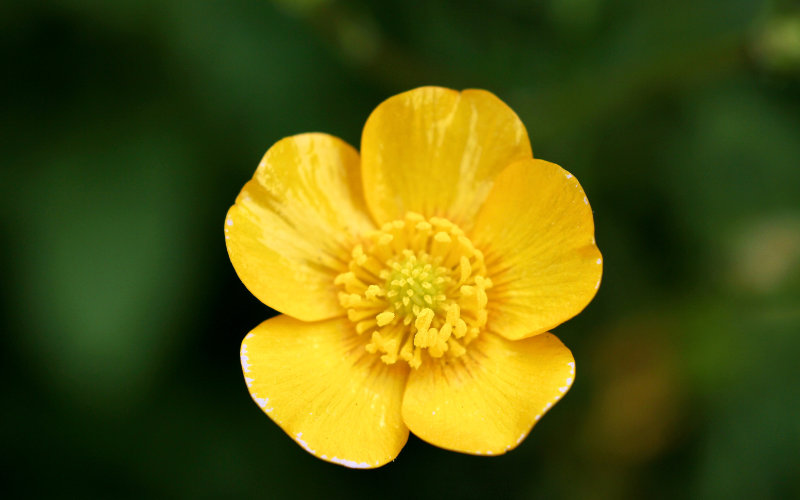
Bulbous Buttercup is a charming flower. It is scientifically known as Ranunculus bulbosus. It is native to Europe and parts of Asia. The flowers are approximately 1 to 2 centimeters long and have a glossy, buttery texture.
This flower blooms in the spring and early summer. It prefers well-drained soils and can thrive in both sunny and partially shaded areas.
| Scientific Name | Ranunculus bulbosus |
| Native Range | Europe, North America |
| Flowering Season | Summer |
Busy Lizzie
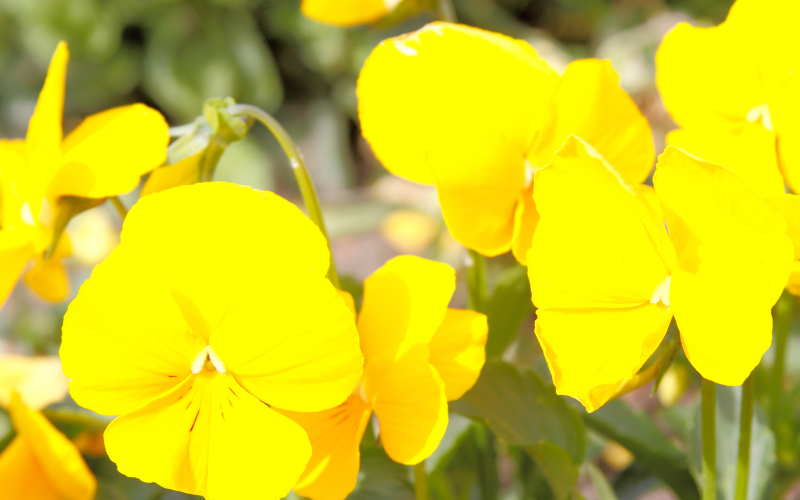
The Busy Lizzie flower is a vibrant and versatile plant. It is scientifically known as Impatiens Walleriana. The flowers can come in various colors, including shades of pink, red, orange, white, and purple.
They thrive in shaded or partially shaded areas and are well-suited for containers, hanging baskets, and flower beds. The flowers typically start flowering in late spring or early summer and continue to produce flowers well into the fall.
| Scientific Name | Impatiens walleriana |
| Native Range | Eastern Africa |
| Flowering Season | Summer and Autumn |
Conclusion
We hope you enjoyed our blog post about yellow flowers and their names. Yellow flowers have a unique beauty that can brighten up any garden or bouquet. From sunflowers to daffodils, marigolds to daisies, we covered a wide range of yellow flowers and their names in this post. Whether you’re a gardening enthusiast or simply appreciate the vibrant beauty of yellow flowers, we hope this article provides you with valuable information. If you have any questions or would like to share your favorite yellow flower, please feel free to reach out to us. Thank you for reading, and may your days be filled with the radiant charm of yellow flowers!
